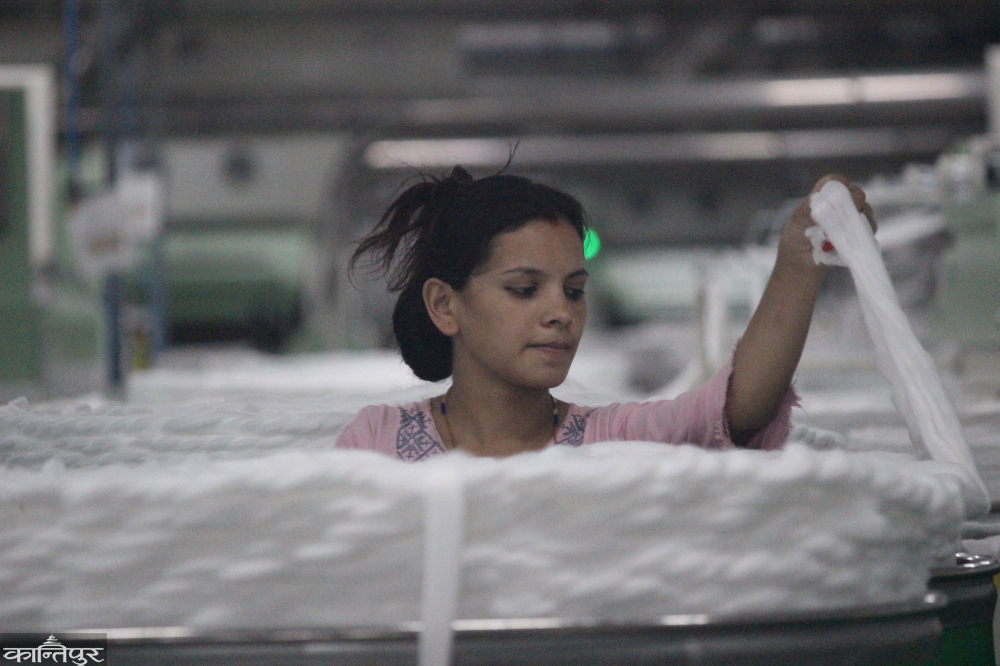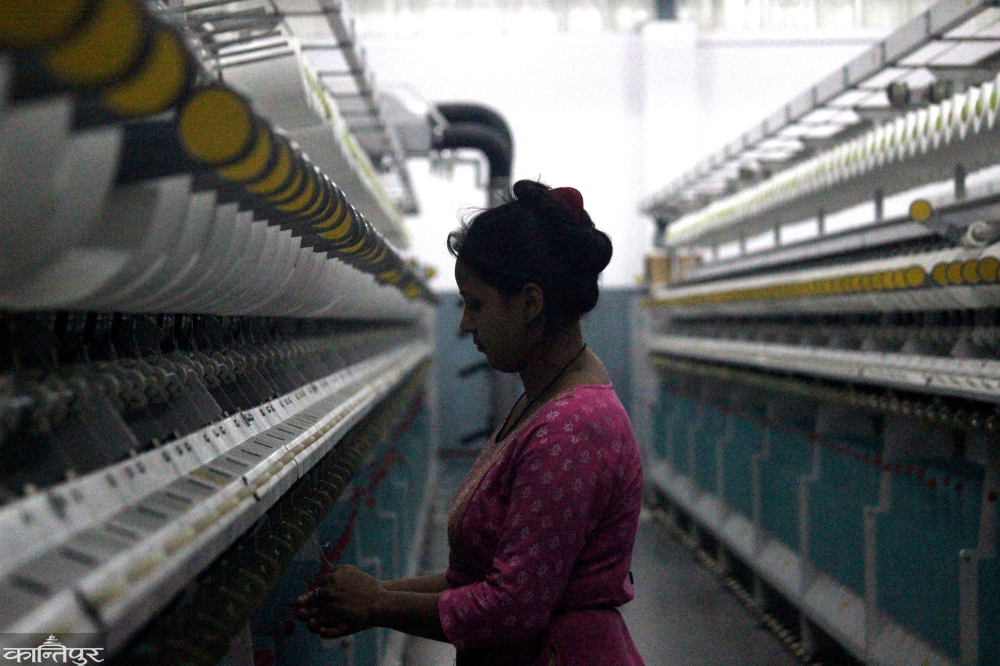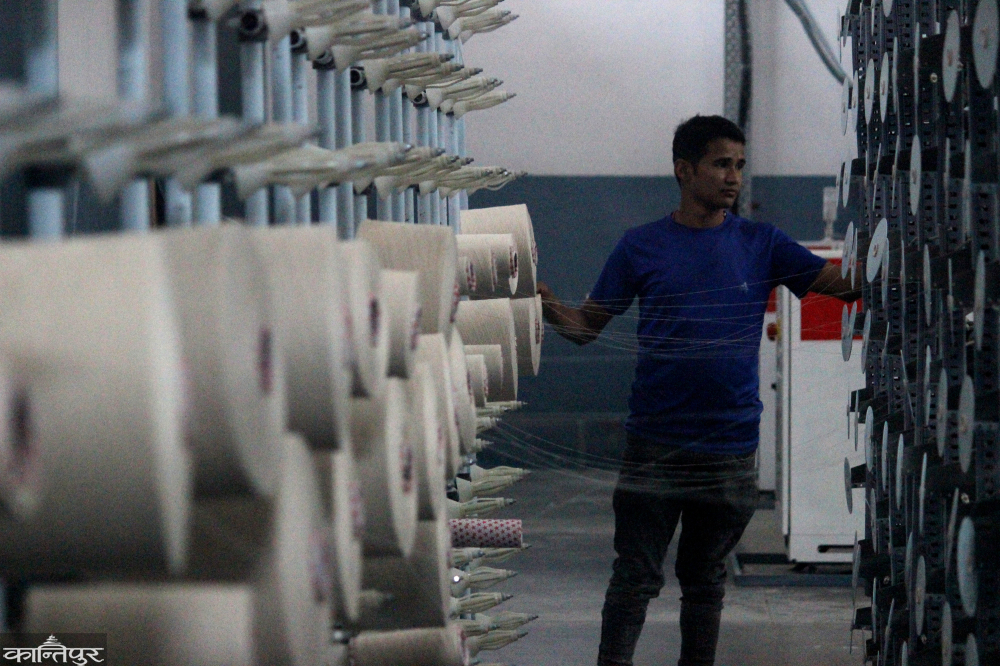With a history spanning three decades, Reliance Spinning Mills is now not only the largest employer in the country, but also established as a leading exporter of its products to India and third countries.
An idea flashed in the mind of industrialist Pawan Golyan 30 years ago, to run a yarn industry. It took him two years to implement the idea. At that time he made a plan, but the fear that the investment would sink did not leave him. How did Golyan get the confidence to import raw materials from abroad, export manufactured goods and bring in foreign currency?

At that time, the wages of workers were low. Bank interest rates were also cheap. There was no duty tax on export trade,’ industrialist Golyan shared his experience, ‘basically, I increased my courage to invest in the industry by keeping that in mind.’ The risk of operating a yarn industry for the first time outside the capital was high. However, Golyan took that risk. On the one hand he started the industry, on the other the Maoist armed conflict started. A whole mountain of problems like unstable politics, heavy load shedding stood in front of Golyan. However, he continued to push past the problem.
The Reliance Spinning Mills industry with a history of three decades has not only become the largest employer in the country, but has also established itself as a leading exporter of its products to India and third countries. After the political change in 2046, a yarn industry factory named ‘Jyoti Spinning Mills’ was opened in Kathmandu. It stopped after a while. Golyan started Reliance Spinning Mills after Jyoti Spinning was shut down. Golyan says that even though Jyoti has been producing yarn under the name of Jai Spinning Mills since 2012, it has not caused any loss to Reliance.
At that time Jyoti alone could not meet the internal demand of yarn. That is why the two neighboring and powerful countries had to meet the demand by importing yarn from India and China. When Golyan laid the foundations of the yarn industry, not only did he replace imports from India and China, but he started exporting yarn to India itself.

This industry, which was started with an investment of around 2 billion, has now reached 15 and a half billion. According to the Human Resource Department, 3 thousand 504 people have got direct employment in the industry which started by employing backward classes and communities in the early days. In which the number of women is 1 thousand 515 and the number of men is 1 thousand 989. Indian labor is very low. “A limited number of Indian workers are employed in the technical department,” said Mahesh Kumar Pokharel, the manager of the industry, “The mills have been producing yarn for a long time in six production units.” . “The new plant will be state-of-the-art,” he said. Annually more than 7 billion yarn is being exported to India and third countries. “There is a plan to operate two new plants soon,” Pokharel said.
He complained that due to the increase in wages of workers, electricity charges, day-to-day transportation costs, bringing raw materials from abroad and producing yarn in Nepal and re-exporting it abroad is a problem. Manager Pokharel said that the cost of production has increased because the cost of land, buildings, mills, machinery, labor and bank interest is not low compared to other countries. He said that due to the open border between Nepal and India, there was a problem in the local sales and distribution along with the collapse of the domestic textile industry due to illegal yarn theft and export and smuggling. Pokhrel said that the consumption of yarn industry is the textile industries and said that the aim of Reliance Industries is to consume the yarn produced by the industry in Nepal itself.
Golyan, an industrialist, took a risk in running the yarn industry, seeing the possibility of exporting. Currently, more than 50 percent of the industry’s products are exported to Turkey, Yemen, Vietnam, Japan, Korea and other countries. 35 percent of production goes to India. 15 percent is consumed in the domestic market. Golyan claims that Reliance Company is meeting about 80 percent of the demand for woolen yarn. In the financial year 2078/079, exports worth 5.5 billion to India, about 2 billion were exported to the third country. Domestic consumption was more than 2 billion 11 million. In the financial year 2079/080, India’s export increased to more than 6 billion, while the export of third countries decreased to 1.2 billion. Domestic consumption is also only 1.86 billion. “Due to the recent earthquake in Turkey, exports were slightly affected, now they are improving,” said manager Pokharel, “Initially, the industry employed 2500 people at one time.” “The contribution of workers to bring this industry to this point is huge,” he said. The industry, which started with 300 workers from India, now employs only a limited number of technicians. There is a separate training center in the industrial complex. Where new and unskilled workers are trained. According to Ramesh Sigdel, an old employee of the industry and training coordinator, the industry has given priority to Nepali workers. According to which they are made skilled by training. “Nepali workers have started to take over the front of the industry,” he said And it is also producing the manpower it needs. “Now Nepali workers have started to take over the responsibility of supervisors,” added Sigdel, “which has gradually reduced the number of Indian technicians.” In addition to efficiency, Sigdel says that in addition to efficiency, discipline, security, reduction of violence against women, and various standards of product production will be trained. Remuneration is provided to the trainees during the training period.

Quarters have been provided for workers. Cheap, clean and hygienic canteens for eating and gardens and open grounds for strolling during holidays are also inside the industry. There is a separate ‘Day Care Center’ for the children of the workers. Sangita Tiwari, a female worker, said that it was a big relief for the female workers as the industry provided them with pads during menstruation. According to Ashish Kafle, the senior manager of the industry, the industry has built a two-storey house so that it is comfortable and convenient for pregnant women to stay, play and sleep for small children. He claims that even the banks have not been able to provide such a facility which is the best corporate culture so far. From health posts to ambulance facilities are also within the industry. “We have also operated an ambulance in collaboration with the Red Cross,” Kafle added, “The industry is serious about the emergency problems faced by the workers.” Manager Pokharel informed that preparations are being made to expand the industry at a cost of 3.5 billion. “Our next industry is being established in the Duhavi-Inaruwa industrial corridor from next year,” he said. 25 bighas of land has been purchased for the new industry. The industry plans to involve the marginalized and backward communities of the region directly in the industry. The industry is importing raw materials from countries including India, China, Thailand and Indonesia. The industry is also planning to start cotton cultivation in different parts of the country for the raw material of yarn.
The industry has a plan to create as many jobs as possible by producing raw material in the country by growing quality cotton than in India. Currently, Reliance is providing yarn to about three thousand industries in the country. “Being able to export quality cotton yarn to close neighbors such as Bangladesh, Bhutan, and Myanmar, along with India, will help the country economically,” Golyan said, “and more jobs will also be created.”

According to Shashikant Agarwal, the owner of Reliance, the government should take a political initiative for the export of yarn to Bangladesh because it is uncomfortable to export yarn from Nepal to Bangladesh. “It is necessary for the government to bring in a long-term policy to consume more of the yarn produced here,” he said -break Reaching the grand building where Reliance Spinning Mills operates, the industry was full of internal generators. The main industry was closed. The workers were spending time waiting for the light. Ashish Kafle, a senior manager of the industry, complained, “The authorities cut off the electricity every day, sometimes there is no electricity for the whole day.” In particular, the government claims that Reliance owes more than 1 billion 94 million electricity dues. However, the industry claims that there is a maximum of Rs 73 crore in arrears. The industry has been consuming electricity of more than 40 million per month. Pawan Golyan, an industrialist, claims that the authority has deliberately cut off the electricity of the industry. “Daily 400 megawatts are being exported to India,” he expressed anger, “what is the secret intention of not giving it to Nepali industry and selling electricity to India cheaply?”

